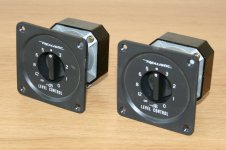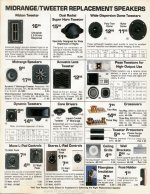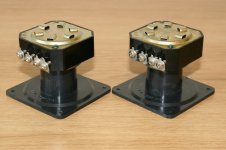Researching a new small 3-Way and several of the XO designs for similar speakers have variable resistance L-Pads on both the midrange and the tweeters.
What are the benefits of using them?
What are the drawbacks other than the high cost?
I don't like padding down a midrange usually but I understand that it is needed to get a proper balance between drivers sometimes.
Locally I can only find one supplier and they are $26- each plus postage and purchasing from O/S won't save anything as International postage has gone through the roof lately
What are the benefits of using them?
What are the drawbacks other than the high cost?
I don't like padding down a midrange usually but I understand that it is needed to get a proper balance between drivers sometimes.
Locally I can only find one supplier and they are $26- each plus postage and purchasing from O/S won't save anything as International postage has gone through the roof lately
I would regard the advantage as being able to change the levels when the acoustic environment of the speakers changes e.g. when introducing new furnishings to the listening room or even introducing the speakers to a different listening room.
Some say the disadvantage is that the contacts between wipers and tracks may become unreliable over time. However, I've been using L-pads on the tweeters of one of my speakers for 30 years now with no signs of deterioration.
Some say the disadvantage is that the contacts between wipers and tracks may become unreliable over time. However, I've been using L-pads on the tweeters of one of my speakers for 30 years now with no signs of deterioration.
Most will eventually develop contact problems and need to be cleaned, or at least exercised enough
to temporarily clear the problem. Fixed resistors are preferable.
to temporarily clear the problem. Fixed resistors are preferable.
Last edited:
+1I would regard the advantage as being able to change the levels when the acoustic environment of the speakers changes e.g. when introducing new furnishings to the listening room or even introducing the speakers to a different listening room.....
Absolutely necessary. Just a wannabee-engineer dream you can plan ahead perfectly.
But the corollary is obvious: the mid-range and tweeter have to start louder than the woofer.
Silly not to bi-amp/DSP if you want to meet today's SQ expectations.... and save yourself endless grief that comes when a conscientious builder is going with passive XO. You just dial it in, listen, tweak, done. Repeat next week if not satisfied.
B.
Last edited:
Strapped Alternative
L-Pads are used to match the output level of drivers with different sensitivities. They may be implemented with resistance ladders that provide 1-5 to 3 dB steps selected by strapping. A lot of steps are not required to align driver outputs. Use these on tweeter drive signals only. This arrangement avoids cost and noise inherent with the use of continuously variable or switched L-pads. WHG
Researching a new small 3-Way and several of the XO designs for similar speakers have variable resistance L-Pads on both the midrange and the tweeters.
What are the benefits of using them?
What are the drawbacks other than the high cost?
I don't like padding down a midrange usually but I understand that it is needed to get a proper balance between drivers sometimes.
Locally I can only find one supplier and they are $26- each plus postage and purchasing from O/S won't save anything as International postage has gone through the roof lately
L-Pads are used to match the output level of drivers with different sensitivities. They may be implemented with resistance ladders that provide 1-5 to 3 dB steps selected by strapping. A lot of steps are not required to align driver outputs. Use these on tweeter drive signals only. This arrangement avoids cost and noise inherent with the use of continuously variable or switched L-pads. WHG
Last edited:
Doesn't work for everyone but what I like to do is have a variable L-Pad on hand during the voicing, adjust levels to suit, measure the DC resistance of the Pad when satisfied and replace it with fixed resistors.
They do have the advantage of an 8 ohm impedance level as well, I've used the ones your talking about Wagner / Loudspeaker kit they are good to 100 watts .
Tannoy uses fixed position variable resistor sets on their tweeter that allow +/- 2dB increments.
Typically the shunt resistor is the one to change, as the series resistor doe shift the axial response somewhat.
Typically the shunt resistor is the one to change, as the series resistor doe shift the axial response somewhat.
The cost is the biggest factor for the tweeters You don't often need 100Watts on the high range but all the faders I have seen recently are 100W
They are helpful when designing a crossover. Once you get it right (not only the level) you won't want to touch them.
Sure, there are variations between songs, but adjusting the whole tweeter is too coarse to fix this. On the other hand, a temptation to keep tweaking the knobs is a sign that there are other problems with your crossover.
Sure, there are variations between songs, but adjusting the whole tweeter is too coarse to fix this. On the other hand, a temptation to keep tweaking the knobs is a sign that there are other problems with your crossover.
Locally I can only find one supplier and they are $26- each plus postage
$26 equates to around £14 and that is the going rate for a 100W L-pad in the UK as shown in the following link: L-Pad Attenuators, 8 Ohm and 16 Ohm 15 -100 watts - Willys-Hifi LtdThe cost is the biggest factor for the tweeters You don't often need 100Watts on the high range but all the faders I have seen recently are 100W
Also note the availablity there of 50W and 15W versions.
P.S. I couldn't resist attaching some L-pad porn in the shape of the Realistic L-pads I've used on a succession of builds over more years than I care to mention - plus a page from a Radio Shack catalogue in which they are featured.
Attachments
- Status
- Not open for further replies.
- Home
- Loudspeakers
- Multi-Way
- Are L-Pads a good idea in a passive XO?



